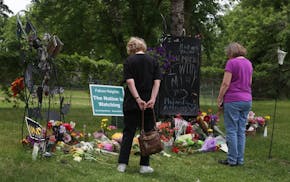Three months before U.S. Ambassador Christopher Stevens died in the attack on the U.S. consulate in Benghazi, Libya, Minnesota Supreme Court Justice Paul Anderson paid a courtesy call to the U.S. Embassy in Tripoli.
Anderson was in Libya under the auspices of the American Bar Association to advise on rebuilding the country's justice system, and Stevens gave him a sobering security rundown. Still, the ambassador encouraged Anderson to get out and mingle with Libyans. The judge recalled noticing how little protection the embassy in Tripoli had compared with those in other restive countries he'd visited.
In a recent interview in St. Paul, Anderson said that he and Stevens, a lawyer by training, developed a quick rapport and spent more than an hour in a broad discussion that ran from constitutional law to the collapse of the police force in Libya. Stevens was well aware of the perils that surrounded him, Anderson said, but he was adamant that good diplomacy meant getting out of the fortress-like U.S. compounds that dot the Middle East.
"He was really upbeat, enthusiastic, about the potential for the future," Anderson said. "His optimism was almost tangible, but I don't think it was Pollyanna or rose-tinted. He knew the risks."
In Washington, debate over the Sept. 11 Benghazi attacks -- one on the consulate and another on the CIA station a mile away that left four Americans dead -- continues to rage, centered largely on whether the Obama administration and U.N. Ambassador Susan Rice attempted to mislead the public about what was known when she appeared on a series of Sunday morning TV talks shows five days later.
The partisan nature of the wrangling infuriates Anderson, who calls Stevens "an American hero" and who, in the immediate aftermath of the Benghazi attacks, wrote an essay for the Huffington Post website in which he defended Stevens for reaching out to Libyans in ways that were unconventional for U.S. envoys who more often are cloistered in heavily guarded compounds.
"He was not careless. He was not cavalier. He was realistic, but he made some very pragmatic decisions," Anderson said. "We will always have people who take risks on behalf of our country because they think it's worth it."
It was easy to feel welcome in Libya, Anderson recalled, despite signs of declining security. Just a week before his arrival in June, a disgruntled militia seized control of the Tripoli airport. But Anderson decided to stick with his plans, and he felt vindicated when the passenger next to him on the plane into Tripoli thanked him for U.S. support in the NATO intervention that was vital to the rebel victory over former leader Moammar Gadhafi.
Remarkable story
The gratitude was even more remarkable, Anderson said, because of the man's story: The fellow passenger was an oil worker whose brother, a physician in Colorado, had flown back to Libya to fight with the rebels and was killed by NATO forces who'd mistaken his unit for regime loyalists because they'd just captured a government tank.
"He'd lost his own brother, and he said, 'Our country is grateful because so many other people would've died if you hadn't intervened,' " Anderson recalled.
The American Bar Association had a representative meet the judge at the airport and take him to the U.S. embassy, which Anderson entered after driving down an alley and through a gate. It was a far cry from the layers of security checks he'd encountered in El Salvador and the Philippines. Anderson said he'd shrugged off the embassy's vulnerability as "a work in progress."
"I'm not critical of it. My impression was, 'I've seen better,' but, gosh, they'd only been there a short time," he said. "We're trying to win the hearts and minds of these people. Is it worth the risk? Yeah. We're not selling our military power."
Anderson was supposed to spend half an hour with the ambassador, but it stretched to double the allotted time as the two talked law, security and Middle Eastern politics. He said Stevens was worried about the struggle to build a police force. The ambassador didn't like that so much of the policing was falling to the militias, former rebels who'd refused to disband and disarm after Gadhafi's fall. Anderson said Stevens described tribalism and the proliferation of loose weapons as other threats to democracy building.
Anderson said he'd asked Stevens directly whether he was safe as a U.S. visitor to Libya. "He said, 'Yeah, you're pretty safe if you exercise caution, don't go out at night and avoid certain neighborhoods,'" Anderson recalled. "He said, 'It's dangerous, no question. But use common sense and you'll be OK.'"
Anderson and Stevens said goodbye with plans to meet again in October, when the judge had hoped to return to check on the progress of the justice system.

Falcon Heights, St. Anthony move toward renewing police partnership severed after killing of Philando Castile
January assault on elderly man turns deadly, marking eighth homicide in St. Paul

Israel-Hamas war creates 'really fraught times' at Minn. colleges

Florian Chmielewski, former senator and Funtime Band accordion player, dies at 97

